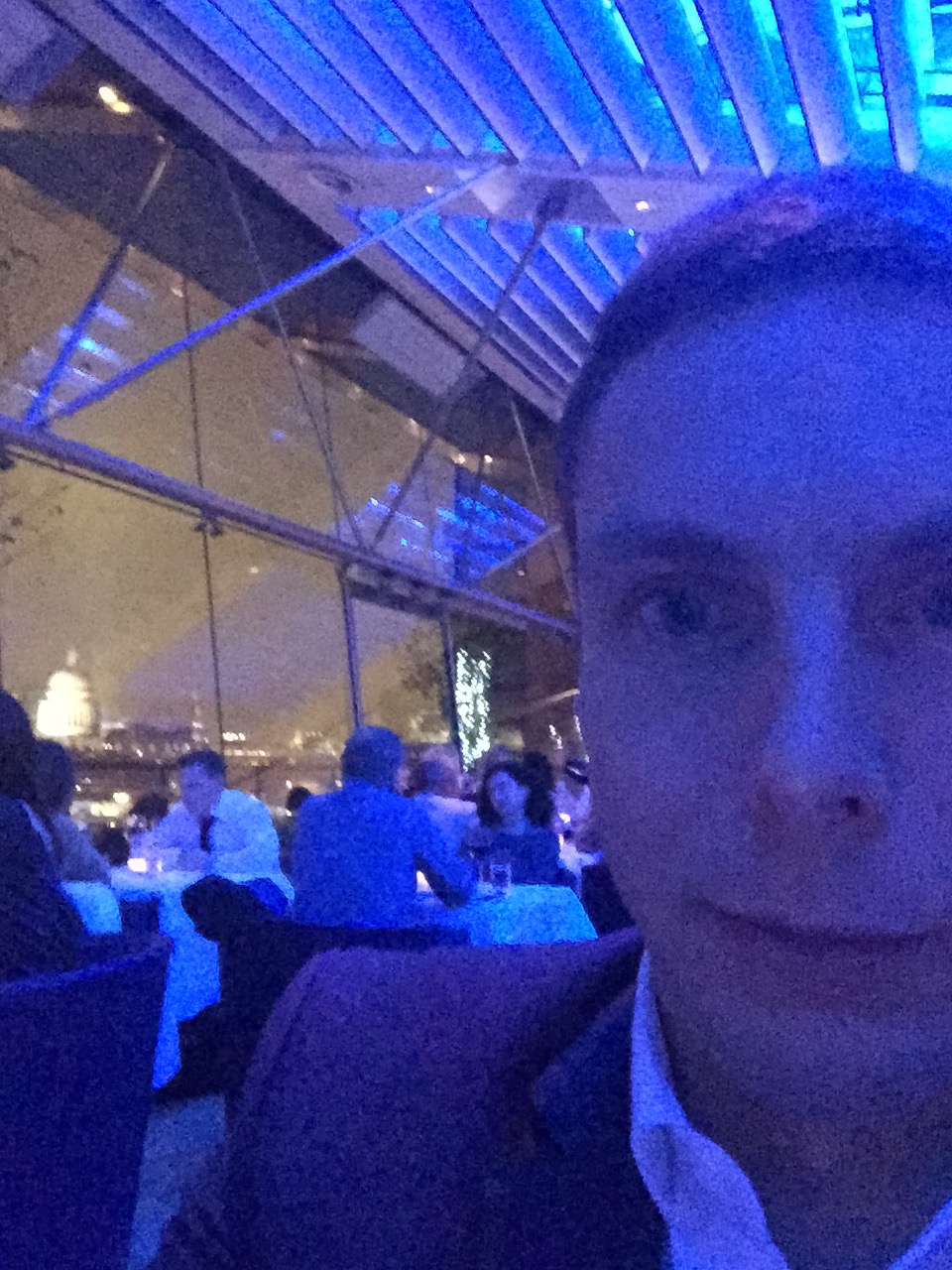This is a story of exploitation...

Bipolar II is risk, not destiny, but I have unwittingly utilised my diagnosed illness in order to achieve things which many can only dream of. There has been a price to pay, which might aptly be summed up as Nick in blue.
For the uninitiated, a chronic illness is something that you will suffer from your whole life, with little hope of a cure or doing anything beyond masking the symptoms. An acute illness is one that presents itself - an episode of an acute illness - but can go away, for days, weeks, months, years or even the rest of your life.
As the Bipolar propaganda proudly purports, many famous 'sufferers' are not really suffering at all in their hypomanic phases, if we consider the following: very few would give up those highs in favour of a normal range of moods, despite the savage depressive episodes which inevitably follow the hugely productive and energy-sapping explosion of activity, which tends to punctuate the cycle.
Why should anyone who is so applauded and revered by bosses, parents, society, for their 'achievements' - measured only on abstract scales such as school and University grades, income and other work-related nonsense such as promotions and job titles - think that they are unwell and seek treatment?
It's very hard to spot a person with Bipolar II in your organisation, your team. When they are hypomanic, they are also productive, but they are disruptive and argumentative. Essentially, they are totally unmanageable and unable to play nicely with plodders. Companies like plodders. Managers like plodders. They make up the numbers nicely and don't give you any surprises.
When your Bipolar II team member becomes depressed, their productivity drops to zero and so do their hours. They will arrive late at work, leave early and generally do very little. However, as a manager, you will be flooded with relief that your team member is now no longer being so disruptive and argumentative, and you will finally see that a hell of a lot of work has been achieved, and happily let the burnt-out wreck turn up and be miserable at their desk.
As a plodder however, you are only waiting for the sleeping beast to re-awaken. It keeps you awake at night. It stresses you out. You only know how to do the thing that you're totally mediocre at, and you absolutely hate change and are unable to deal with it, so the idea of getting away from the source of this stress is unthinkable. You stay and accept round after round of unintended abuse.
Organisations like productivity, and stressed plodders are even less productive than normal plodders, so when they speak up and say that they are tired (from all the lost sleep) and stressed and they can't plod as averagely as they had been plodding before, the management don't tend to be very sympathetic. Often times, it's the poor plodder who gets the shove rather than the primadonna Bipolar II golden boy or girl.
Now, if this sounds Sociopathic, Narcissistic and arrogant, you are mistaken. Our entire pyramid-scheme structure is rather adversarial, and when we set targets for our employees in these fake hierarchies, we do so in the full knowledge that there are more people competing for the next rung on the ladder than there are fake job titles at the next tranche in the pyramid. We are deliberately asking people to squabble with each other over those precious promotions.
The Narcissist believes he or she is special, and deserves special treatment, deserves the status that they have (or better normally!). I personally, always wonder why people are listening to me, why I am the one who seems to be making the decisions or getting the promotion, because I don't do the work that's asked of me, play politics or jump through the hoops and clap like a trained sea lion in a circus, which is what we are told will get us to the top of the tottering tree.
Believe me, I try to fit in as best as I can. I have literally been crying every morning for weeks and months on end, when I am nearly dead with depression, but yet I have to try and comply with somebody else's idea of ideal office hours. Likewise, I try and do what is asked of me by my bosses, but unless you know how to do it at plod pace, you have normally finished your work by lunchtime on Tuesday, and your boss is rather annoyed that he or she now has to give you some more... so you have actually failed to please your boss.
So, there are a few things I have found, which help to give me a little more stability: to cap and floor the moods, so to speak, and not have absolutely bat sh1t crazy hypomania, and dangerously low depression:
- Breakfast : this is absolutely crucial. The stomach is a key part of our circadian rhythm. Digesting that first meal tells your body clock that "this is the time to get up tomorrow". I never used to be a morning person until I started eating breakfast, and now I spring out of bed with no "snooze" button presses at 7am.
- Lunch : I think you can probably see where this is going. Yes, lunch is important, because it breaks the tendency to just work without a break. When a person gets going in a hypomanic phase, they can work for days almost without sleep or breaks
- Dinner : saying to yourself that you need to stop work so that you can eat and digest before winding down for the day is crucial. Eating before 9pm is mandatory, and eating before 8pm is preferred. Otherwise, you find yourself gorging on whatever you can find, just before collapsing after 18 straight hours with no food at all since waking up.
- Wind-down : almost impossible if you don't start early enough, but essential preparation for the next part of being an animal.
- Sleep : not something you always feel like doing. Your intuition can be totally wrong when you are hypomanic, and usually you are way more tired than you realise, even though you don't feel like sleeping and you most definitely can keep on working. You would not even believe how many nights of sleep I have skipped in a row. Sleep is essential for energy, mood and the immune system. You get really sick if you don't have 6 or 7 hours a night, at least. More than 9 is too many... you'll get lethargic, or perhaps you are exhausted and depressed and you don't even realise!
In addition to this, there are some other rules:
- No caffeine : because it's a Dopaminergic and Noradrenalinergic stimulant in the same class of chemicals as amphetamine. It's a potent wakefulness agent in the brain, and will mess you up. "Do stupid sh1t faster and with more energy" is accurate.
- No alcohol : because it's a GABA agonist, like Diazepam (Valium) and you will develop a physical dependency on it, requiring it to be able to sleep, especially if you have been drinking coffee. It's the same as mixing uppers & downers as any other kind of drug addict. Did you know you're a junkie? Think about that next time you're looking down your nose at somebody. Alcohol is also hydrophilic, which means that it draws water out of the cells in your body... you are actually less full of life-giving water, when you are full of booze.
- No psychoactive medicines or drugs : the brain and body are homeostatic. That means, they are designed to stay in equilibrium. You don't need to add anything apart from glucose, water and a few vitamin, mineral and amino acid trace amounts, which you can get from proteins. Fatty proteins should give you everything you need (yes, animal fat is good for you in its natural form).
And finally:
- Exercise the brain and the body equally : when the brain is tired and the body isn't, it doesn't have a frigging clue why you are not absolutely whacked out and ready for bed. In our modern sedentary society, where we do little more than scroll through emails and web pages, our brain is a lot more tired than our muscles. This is not natural, and leads to 'brain exhaustion' despite the rest of you being physically dormant.
Of course, this recipe for mood stability is what I aspire to perfect, but it takes practice. I'm still working on keeping the routine, and resisting the temptations of a cold beer or a glass of wine. Giving up tea and coffee was one of the hardest things I have ever done, and I still have my 'methadone' in the form of mint leaves in hot water.
By the way, anyone who tells you sugar is a drug is an idiot. What's next, Oxygen is a drug?

Sex can be addictive, but it's not unhealthy. However, an unsatiated libido is most definitely unhealthy and unnatural (March 2015)
Tags: #career #mentalhealth #bipolar #sex
